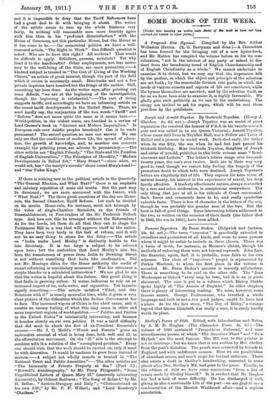Famous Impostors. By Bram Stoker. (Sidgwick and Jackson. 10s. 6d.
net.)—The term "impostor" is practically extended to swindlers and pretenders of all kinds, and even to some persons whom it might be unfair to include in these classes. There was a basis of truth, for instance, in Mesmer's claims, though his methods of enforcing them were not beyond reproach. John Law, the financier, again, had, it is probable, some faith in his own schemes. The class of " impostors " proper is represented by Perkin Warbeck, to whom the first place in the volume is accorded. Mr. Brain Stoker's account is scarcely satisfactory. There is something to be said on the other side. The "Jean Werbeeque or Osbeck " story may be true, but it is an ex parte statement. The case is put in a volume which Bishop Stubbs spoke highly of, "The Annals of England." In other chapters, there is plenty of interesting reading. We miss, however, some famous names. George Psalmanazar, who invented a whole language and took in not a few good judges, ought to have had a place. As for the last story, "The Boy of Bisley," a strange legend that Queen Elizabeth was really a man, it is surely hardly worth its place.






















































 Previous page
Previous page